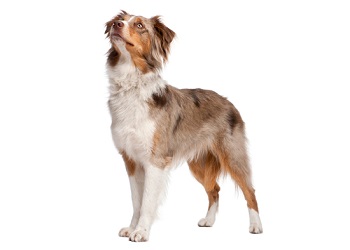 Despite its name, the Australian Shepherd was introduced to Australia in 1990 from America where it was a hard working and tireless herding dog. It was used in the Rocky Mountains because it was not generally affected by high altitudes.
Despite its name, the Australian Shepherd was introduced to Australia in 1990 from America where it was a hard working and tireless herding dog. It was used in the Rocky Mountains because it was not generally affected by high altitudes.
This dog has been long valued in Australia for its loyalty and its working ability. Today, Australian Shepherds continue to work as stock dogs and compete in herding trials. They are also active in dog sports, such as agility and flyball, and used as search and rescue, detection and therapy dogs.
The affectionate and active Australian Shepherd loves to play and spend time with their family.
Personality
The Australian Shepherd is a willing dog which tends to bond with one person, forming an intense, devoted relationship with its owner.
This breed has strong herding and guarding skills. They are also naturally protective, agile and attentive, making them an excellent watchdog. Their willingness to be trained means the Australian Shepherd makes a valuable police dog, guide dog or even a TV or movie star.
These dogs learn quickly and love to play. Like all dogs, Australian Shepherds can become hyperactive or destructive if not given enough stimulation and attention.
Upkeep
These dogs need regular grooming, and more frequent grooming when getting their winter coat to prevent matting. Matting can occur behind the ears and between the toes and this can be very painful for a dog. A thorough weekly grooming keeps shedding to a minimum.
Do not expect an Australian Shepherd to lie around the house all day or stay in the backyard for hours on end without company. They require exercise and stimulation to keep their minds active.
Like all dogs, Australian Shepherds require regular tick, flea, intestinal worms and heartworm treatments. Consult your veterinarian on treatment options. Desexing and vaccination against diseases, such as the deadly parvo virus and highly infectious canine cough, are also important to discuss with your vet.
Compatibility
Australian Shepherds are playful, intelligent, affectionate and good-natured dogs. They are good with other pets, but can be shy with new people. Their affectionate and friendly nature makes them excellent with children.
They need daily exercise and stimulation. They also require attention and to be involved in family life. Teaching tricks, agility or any physically and mentally challenging tasks will result in a happy, well-socialized dog. As with all highly intelligent dogs, it is important to start training Australian Shepherds early.
A happy and accommodating companion, the Australian Shepherd will match the lifestyle of their owner and can be found living on farms, in apartments, and most situations in between. Australian Shepherds love their people and do require quality time with them even if it is watching TV on the couch after a stroll around the neighborhood.
If an Australian Shepherd is to spend unsupervised time in the backyard, high fences are a must. They are very curious and particularly good jumpers, and may just decide to investigate something outside the yard!
Fact file
Breed classification Herding dog
Size Medium
Origin USA
Lifespan 11-13 years
Colors Black, red, blue and red merle
Cost $1000-$2000
Common hereditary problems Eye diseases and hip dysplasia.
